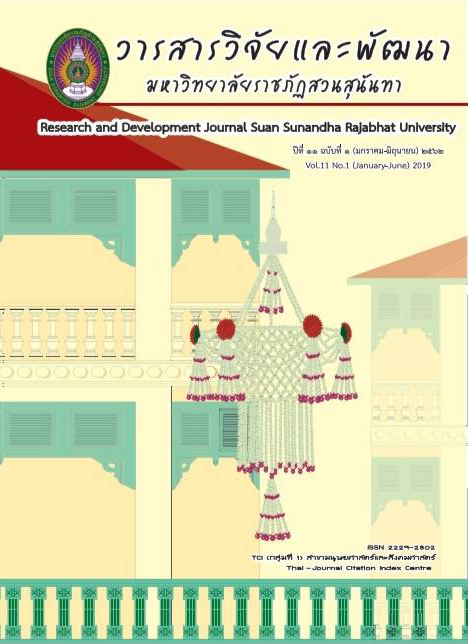การถ่ายทอดเทคโนโลยีระบบสูบน้ำและเครื่องสกัดสารป้องกันกำจัดศัตรูพืช จากพลังงานแสงอาทิตย์สู่ชุมชนบ้านเหล่าโพธิ์ จังหวัดมหาสารคาม
DOI:
https://doi.org/10.53848/irdssru.v11i1.180868คำสำคัญ:
การถ่ายทอดเทคโนโลยี, พลังงานแสงอาทิตย์, ระบบสูบน้ำพลังงานแสงอาทิตย์, เครื่องสกัดสารป้องกันกำจัดศัตรูพืชโดยใช้พลังงานแสงอาทิตย์บทคัดย่อ
งานวิจัยนี้มีวัตถุประสงค์เพื่อ 1) ถ่ายทอดเทคโนโลยีระบบสูบน้ำและเครื่องสกัดสารป้องกันกำจัดศัตรูพืชจากพลังงานแสงอาทิตย์ 2) เพิ่มผลผลิตทางการเกษตรและชุมชนมีรายได้เพิ่มขึ้น 3) วิเคราะห์จุดคุ้มทุนระหว่างการใช้เทคโนโลยีพลังงานแสงอาทิตย์กับวิถีเดิม พื้นที่ดำเนินการวิจัยเป็นพื้นที่สาธารณะประโยชน์ของบ้านเหล่าโพธิ์ ตำบลหนองจิก อำเภอบรบือ จังหวัดมหาสารคาม จำนวน 40 แปลง เป็นงานวิจัยประยุกต์ เครื่องมือที่ใช้ในการเก็บรวบรวมข้อมูล ประกอบด้วย แบบสอบถาม Mind Map SWOT Analysis การสัมภาษณ์เจาะลึก ปฏิทินฤดูกาล และการสังเกต ผลวิจัยพบว่า ชุมชนมีความรู้ความเข้าใจในการใช้งานเทคโนโลยีและสามารถใช้งานเครื่องได้ และมีความพึงพอใจมากสนใจนำไปใช้งานในอนาคต จากการใช้เครื่องสกัดสารป้องกันกำจัดศัตรูพืชจากพลังงานแสงอาทิตย์โดยใช้สมุนไพรในชุมชน พบว่า เครื่องสามารถผลิตสารสกัดสมุนไพรได้ภายใน 1 วัน ทำให้ทันต่อการระบาดของแมลง ลดการซื้อสารเคมีมาใช้ทำให้สามารถลดต้นทุนลงได้ 500 บาทต่อแปลงต่อรอบการผลิต จากการใช้ระบบสูบน้ำพลังงานแสงอาทิตย์ พบว่า ระบบสามารถสูบน้ำได้ปริมาณ 12,000 ลิตร สามารถสร้างรายได้ให้กับครัวเรือนแต่ละแปลง ประมาณ 20,000-30,000 บาท การวิเคราะห์จุดคุ้มทุน พบว่า ระบบสูบน้ำพลังงานแสงอาทิตย์ใช้งบประมาณในการสร้าง 120,000 บาท สามารถคืนทุนค่าน้ำได้ภายใน 12.5 ปี เครื่องสกัดสารป้องกันกำจัดศัตรูพืชจากพลังงานแสงอาทิตย์ราคา 35,000 บาท สามารถผลิตสารสกัดได้ 75 ลิตรต่อวัน คืนทุนค่าสารกำจัดแมลงได้ภายใน 1.7 เดือน การต่อยอดขยายผลทางองค์การบริการส่วนตำบลหนองจิกได้กำหนดแผนงบประมาณที่จะสนับสนุนให้กับทางกลุ่มเป็นรายปี เพื่อให้เกิดความยั่งยืนและจะขยายไปยังพื้นที่อื่นต่อไป
เอกสารอ้างอิง
Chayakot, S. (2011). Cost-effectiveness in using groundwater systems for agriculture in areas 9 and 14, Soeng Sang Sub-district, Soeng Sang District Nakhon Ratchasima. Master's thesis. Suranaree University of Technology. Civil Engineering.
Kaewpan, K. (2015). Financial return analysis of the solar water pumping system for the production of organic vegetables for farmers in Phutthaisong District, Buri Ram Province. Journal of the Researchers Association, Year 20, Issue 2, May-August 2015, Page 148- 160.
Nakthim, C. (2008). The role of leaders in knowledge management of organic farming farmers: a case study of the natural agricultural group, Tamo Subdistrict, Prasat District, Surin Province. Master's thesis. Thammasat University Faculty of Social Work, Department of Community Development.
Rueysungnoen, S. (2006). Project to create soil-water-plant-animal learning center management To create environmental health, health and quality of life in the group of vegetable growers in the area of Daeng Mo Subdistrict Khueang Nai District Ubon Ratchathani. Khonkaen University.
Saengthong, J. (2009). Knowledge management capabilities of individuals, Agricultural Land Reform Office. Master's thesis. Thammasat University. Faculty of Social Work. Department of Labor Development and Master Welfare
Samarapat, P. (2015). Economic cost-effectiveness assessment of solar pumping systems for agriculture. Research article Year 4, Issue 3 September - December 2015.
Thammawongsa, K. (2010). Farmers-nature learning management for farmers to farmers of Song Salung Natural Agriculture Learning Center, Klaeng District, Rayong Province Master of Community Development Thesis. Thammasat University. Faculty of Social Work, Department of Community Development.
Theerasaksophon, K. (2007). Development and factors affecting the decision to choose non-chemical agriculture. Master's thesis, Thammasat University. Faculty of Social Sciences, Community Development Program
Waewsak, J. (2007). Development of integrated pumping systems with solar and wind energy for rice farming in Phatthalung province. Research results. Thaksin University. Songkhla.
ดาวน์โหลด
เผยแพร่แล้ว
รูปแบบการอ้างอิง
ฉบับ
ประเภทบทความ
สัญญาอนุญาต
บทความที่ได้รับการตีพิมพ์เป็นลิขสิทธิ์ของ สถาบันวิจัยและพัฒนา มหาวิทยาลัยราชภัฎสวนสุนันทา
ข้อความที่ปรากฏในบทความแต่ละเรื่องในวารสารวิชาการเล่มนี้เป็นความคิดเห็นส่วนตัวของผู้เขียนแต่ละท่านไม่เกี่ยวข้องกับมหาวิทยาลัยราชภัฎสวนสุนันทา และคณาจารย์ท่านอื่นๆในมหาวิทยาลัยฯ แต่อย่างใด ความรับผิดชอบองค์ประกอบทั้งหมดของบทความแต่ละเรื่องเป็นของผู้เขียนแต่ละท่าน หากมีความผิดพลาดใดๆ ผู้เขียนแต่ละท่านจะรับผิดชอบบทความของตนเองแต่ผู้เดียว





